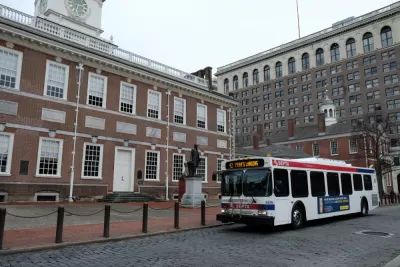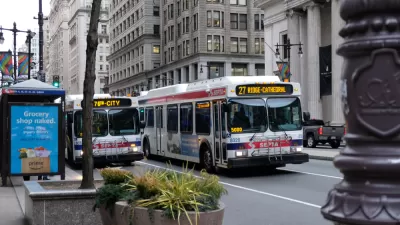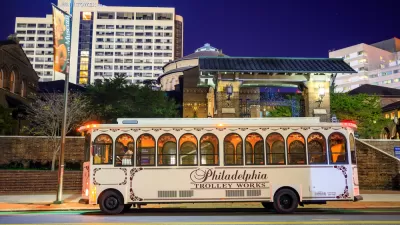Philadelphia’s transit agency faces some structural challenges as it struggles to reorganize its services and bring back ridership.

At a hearing on Monday, Philadelphia’s city council will discuss the proposed changes to Southeastern Pennsylvania Transportation Authority’s (SEPTA) bus routes, which manages public transit in the city and beyond. Matt Sullivan reports on the story for the Philadelphia Inquirer.
According to Sullivan, “Much of what is possible is going to depend on developing and funding bold plans to increase SEPTA’s ridership, and that means pressing for improvements systemwide.” Beyond bus route adjustments, “it’s crucial that agency management reexamine its professional standards for outside contractors, become a better partner with its own workforce, and firm up its shaky commitment to transit equity.” Sullivan describes the agency’s troubled partnership with its Key Card contractor, as well as its history of labor disputes. “Just as the agency should be pressed to do better by riders, it should be pressed to do better by its workforce,” Sullivan writes.
Additionally, “SEPTA management must commit itself fully to transit equity, ensuring all communities have access to great public transport that gets them where they need to go.” Sullivan suggests starting with an end to transfer fees, which impact low-income riders the most. “It’s no mystery which transit riders live in West Philly, North Philly, and along Kensington Avenue, and the Pew study makes it clear that the fare structure amounts to de facto discrimination.”
FULL STORY: SEPTA’s issues go deeper than Bus Revolution

Alabama: Trump Terminates Settlements for Black Communities Harmed By Raw Sewage
Trump deemed the landmark civil rights agreement “illegal DEI and environmental justice policy.”

Study: Maui’s Plan to Convert Vacation Rentals to Long-Term Housing Could Cause Nearly $1 Billion Economic Loss
The plan would reduce visitor accommodation by 25% resulting in 1,900 jobs lost.

Planetizen Federal Action Tracker
A weekly monitor of how Trump’s orders and actions are impacting planners and planning in America.

Waymo Gets Permission to Map SF’s Market Street
If allowed to operate on the traffic-restricted street, Waymo’s autonomous taxis would have a leg up over ride-hailing competitors — and counter the city’s efforts to grow bike and pedestrian on the thoroughfare.

Parklet Symposium Highlights the Success of Shared Spaces
Parklets got a boost during the Covid-19 pandemic, when the concept was translated to outdoor dining programs that offered restaurants a lifeline during the shutdown.

Federal Homelessness Agency Places Entire Staff on Leave
The U.S. Interagency Council on Homelessness is the only federal agency dedicated to preventing and ending homelessness.
Urban Design for Planners 1: Software Tools
This six-course series explores essential urban design concepts using open source software and equips planners with the tools they need to participate fully in the urban design process.
Planning for Universal Design
Learn the tools for implementing Universal Design in planning regulations.
Caltrans
Smith Gee Studio
Institute for Housing and Urban Development Studies (IHS)
City of Grandview
Harvard GSD Executive Education
Toledo-Lucas County Plan Commissions
Salt Lake City
NYU Wagner Graduate School of Public Service





























